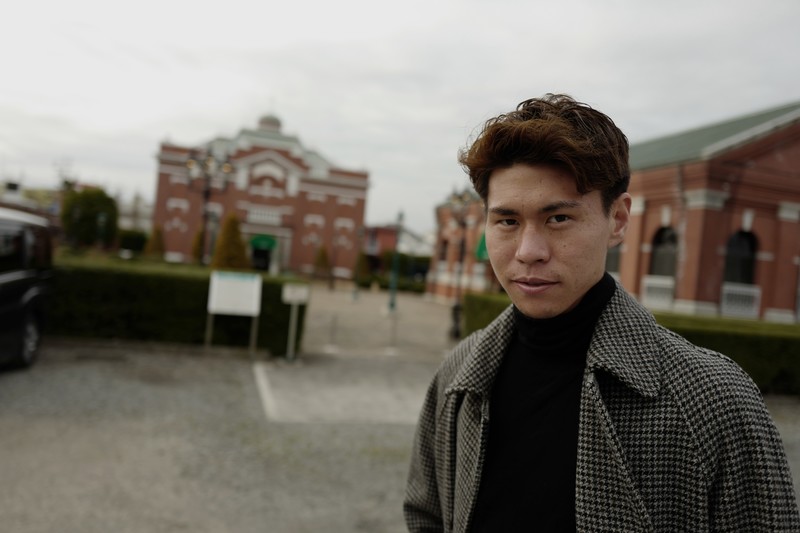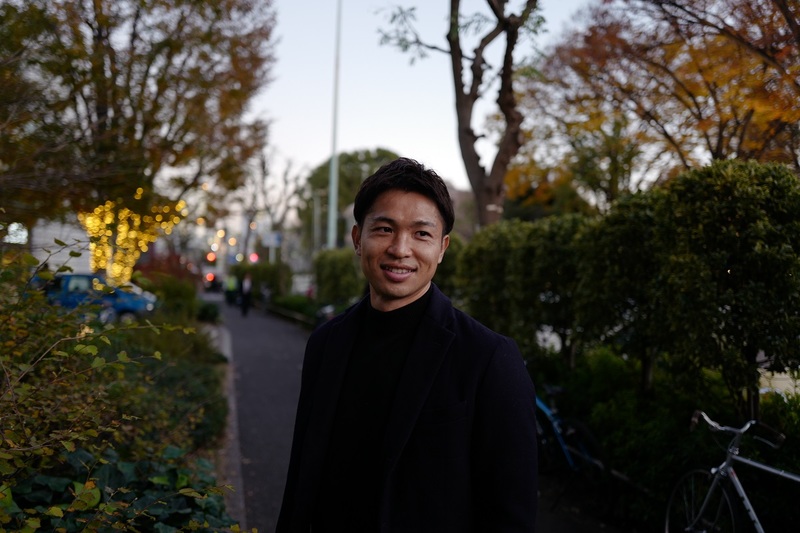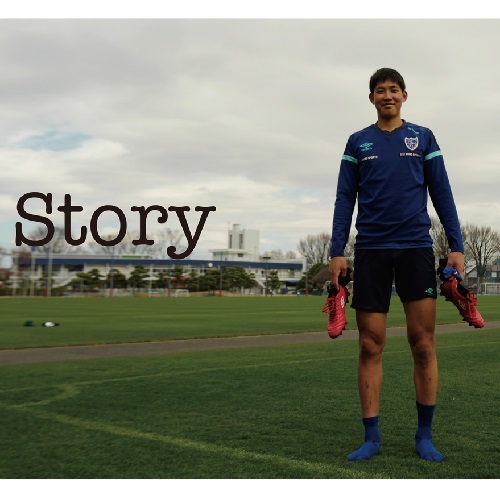With my back to the tower glowing orange, I set out on a journey from which there was no turning back that day.
On that journey, I was guided by the signposts I encountered, learning the path to take and continuing to survive.
Thus, without a scenario, we step into uncharted territory.
In the city overlooked by the tree, the endless journey of TOKYO's new icon continues.
The journey is halfway, Kento HASHIMOTO's final destination is still ahead.
Unending Ambition for Improvement
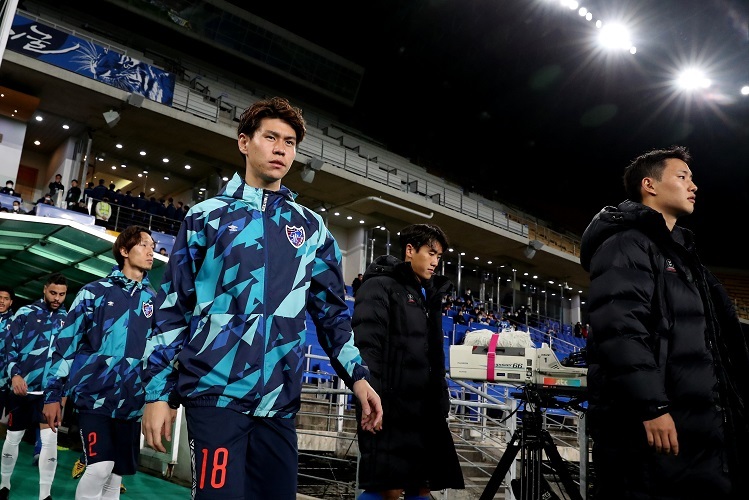
Looking back on your career so far, haven't you achieved significant growth each time you were faced with a barrier?
"I have tried to view myself objectively and have always sought what I need to do to survive. When I was in high school, I felt my scoring ability as a forward was limited. In that situation, Mr. Kuramata (Hisao KURAMATA, then U-18 coach) converted me to a defensive midfielder, which became a turning point. From there, my playing style also changed."
―― What did you think when you were asked, 'Would you like to try playing as a defensive midfielder?'
"Right after I was converted, I thought, 'This might be my position.' The timing was right. When I first played as a defensive midfielder during a tough period, I felt relieved, thinking I could manage this role. Even as a forward, I was good at taking the ball away from opponents. Playing in midfield, I realized I could showcase that skill even more. From now on, I felt it was important to make ball-winning ability my trademark, and that realization was significant."
――That conversion opened the path to becoming a professional. However, it was not like he immediately secured a position in the top team.
"Since my third year of high school, I started joining the top team's practice sessions, but there were amazing players in the same position. Even in the play of taking the ball, which I thought was my strength, I felt I couldn't compete at all with Yone-kun (Takuji YONEMOTO) or Mr. Yasuyuki KONNO. Maybe that's when I lost a bit of confidence."
— At times like that, I often caught my seniors and coaches to ask for advice.
"It's nostalgic. I have always accepted advice from others honestly. There were many amazing players and wonderful coaches around me. Of course, I learned by watching, and whenever I didn't understand something, I asked and turned it into my own strength. It was a repeated process. Even now, I watch the training that Morige-kun (Masato MORISHIGE) does and incorporate it, and if young players are doing interesting training, I don't hesitate to ask. Since I have a personality that is interested in new things, my spirit of wanting to try first has not changed."
— Do young players ever ask you for advice, like you once did?
"It might be a small number. But if there are people nearby who have had experiences that are not easy to come by, wouldn't you want to listen to them? If you can learn what kind of things players who have achieved results have done and what their mindset is, you might be able to get a little closer. This is not limited to soccer alone. I want to hear from people in various fields. I like learning things I don't know, and my desire to improve and gain knowledge never fades."
――Why do you never lose the desire to grow further?
"I was never a naturally talented player. I believed that if I didn't absorb and learn from others, I wouldn't be able to succeed in this world. I've always maintained a sense of urgency that I must constantly grow. Right after turning professional, I only had the determination to prove myself. However, in my first and second years, I couldn't play in any matches at all, and I realized that I couldn't continue like that. To become a good player, I must keep stealing the good qualities from others. After deciding that I needed to change my mindset, I think I became more eager to grow. I have tried to challenge and absorb everything. By doing so, I gradually felt my growth and gained confidence. I believe that continues even now."
――Looking back on the path you have taken, where do you think the turning point was?
"Of course, my first year as a professional was like that, and looking back, I think there were many turning points. It was the same when I was loaned to Roasso Kumamoto, and also when I returned to Tokyo and couldn't play in matches. So many things happened that it's hard to pick just one."
Extraordinary Basic Training
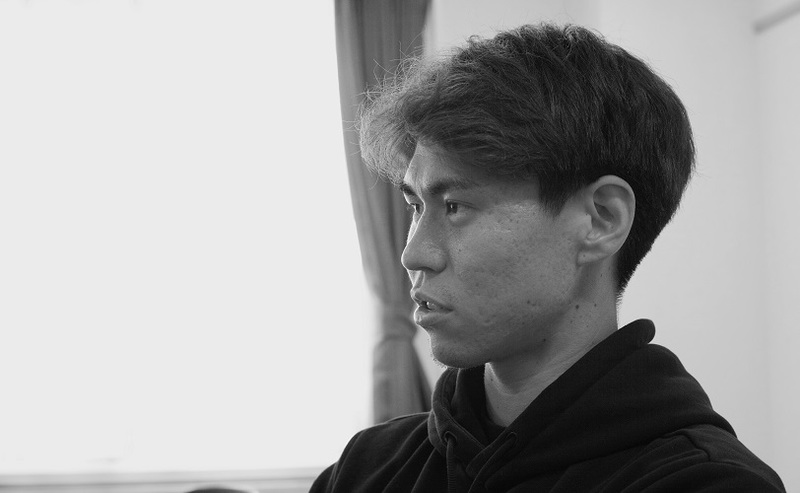
――Could you take a little time to look back on each of those? First, your training journey to Kumamoto.
"At that time, I had completely lost confidence. I was even starting to forget what kind of player I was. Since I wasn't playing in matches, I didn't even know what I could and couldn't do. By continuing to play in matches, I was able to recall my strengths. My positions were defensive midfielder and center back, and during my one and a half years with the team, I played in about 60 matches. I was also able to internalize the weekly cycle of preparing for matches. In Kumamoto, everything was a first-time experience for me."
――I believe the fear of being relegated was always present.
"There were so many moments. I still remember, I even cried on the plane going there. It felt like a do-or-die situation. At that time, Kumamoto was a team positioned near the bottom of J2. There was always the fear that it might be a one-way ticket. Even so, I had no other choice. I was sent off with the message that there was no place for me in Tokyo. I believed that if I didn't succeed here, I couldn't come back, and I was determined. Leaving Tokyo and living alone were both first-time experiences. In a place where no one knew me, it felt like a huge challenge for a teenager like me."
――So, wasn't it significant to have met players who grit their teeth and fight hard?
"I was able to meet experienced players like Kitaji (Hideo Kitajima), Chikara (Fujimoto), and Yuta MINAMI, and we talked thoroughly about football. I received a lot of advice, and in terms of pursuing football, I think it was a valuable time. Above all, the training was hard, so it was a place where I felt growth in many aspects."
I believe the confidence gained in Kumamoto was significant.
"At the end of my first season after the transfer, I was told to come back from Tokyo, but at that time I lacked confidence and asked to stay in Kumamoto for another year. After the second year, having gained match experience and improved my physical strength, I returned with confidence thinking I could make it. However, I couldn't play in any matches at all. Outside the scrimmage, I was endlessly passing the ball with Mr. AMMA (Takayoshi AMMA / current coach) and others. That was tough. I was on the verge of breaking mentally and my motivation was fading again. But from the training with Mr. AMMA at that time, I truly learned a lot. He taught me from scratch what I was lacking and made me realize many things. Although I couldn't participate in the scrimmage, I believe it was an important time for me."
――The image of starting over with basic training at the edge of Kodaira Ground remains impressive.
"Mr. Anma speaks very bluntly (wry smile). With a straight face, he says, 'You're really bad. Plays like this make the stands sigh.' Every time I made a mistake, he would say in his unique way, 'Okay, sigh.' Even so, I kept calmly repeating practice. I think some players would get upset hearing that kind of talk. I might have felt a 'I'll show you' kind of spirit. But more than that, I felt grateful. There aren't many people who straightforwardly tell you what's wrong without sugarcoating it. Since those were things I hadn't even noticed myself, I thought that if I could improve on them, I could become a better player. I owe it to Mr. Anma that I came to believe this is where my potential lies. I often practiced together with Wataru SASAKI (currently at Kamatamare Sanuki), and while Wataru was being praised a lot in his first year, I was being harshly criticized right next to him. Because of that, when I found my shortcomings, I was able to dedicate myself to practice. Mr. Anma also stayed for extra practice with me, and the time we spent watching lots of footage together and facing our challenges was invaluable."
――I think it's amazing that they continued that plain practice not just for a few months, but consistently over a long period.
"I think the most important thing is feeling that you have improved yourself. It made me realize once again how essential those basics are. From an outsider's perspective, they might think, 'What kind of practice is that?' There were even drills where we just kicked the ball face-to-face. Even now, I sometimes review those practices to regain my sense. That training was that important."
How to Change a Life You Don't Have
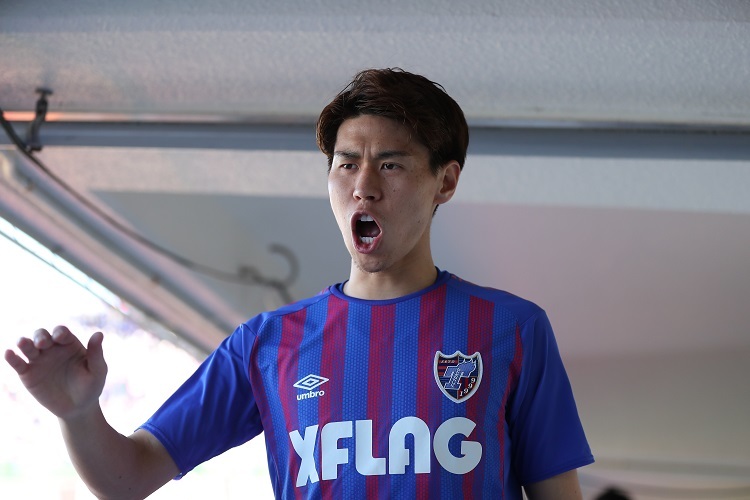
— And he immediately delivered results when given the chance. The J1 debut match against Matsumoto Yamaga is an unforgettable game.
"That was really significant. By chance, many players got injured, and I played as a left midfielder, which is not my usual position. It was also my first time playing in that position in a match. I was really anxious about whether I could perform. But at that moment, I felt that if I didn't score, there wouldn't be a next chance. My senses were sharpened. I was only thinking about scoring. I believed that just a few good plays wouldn't change my standing within the team, so I entered the match with the mindset that nothing but goals would do."
――It was a match that simply amazed us, where a player once branded as an unqualified FW scored a goal at that crucial moment.
"It was my first start, first appearance, first shot, and first goal in J1, right? (laughs) Until then, I thought I was 'unlucky.' But... in that match, I realized that the effort I put in would come back to me."
――Even if it takes more time than others, I have steadily drawn opportunities to myself. I have continued such a career path.
"If I hadn't made an effort, I believe my life would have been one of always 'not having it.' If you steadily continue doing what you need to do, it might not be immediate. But someday, it will surely come back to you. Believing that, I have kept going."
— During the 2017 season, Yoshito OKUBO, who was on the team, repeatedly told me to make vertical passes during the match.
"It was definitely Yoshito-san who made me strongly aware of vertical play. I began to see things I hadn't noticed before. During the match, he carefully told me exactly where I should focus at each moment, saying things like 'now here, now here.' I honestly felt that was something I lacked. The experience and knowledge Yoshito-san possesses are truly amazing. Sometimes he spoke strictly, but considering my growth, I was grateful for that. I accepted it sincerely."
――Why can you remain honest with soccer?
"I believe it's because when I was young, I had experiences of receiving advice from others and learning from them to grow. Without realizing it, that became a habit, so I adopted the mindset of first accepting things. Therefore, there are always areas I want to improve or make better. That's because I analyze myself. I'm always thinking about how I can grow, and there are people around me who watch me with a critical eye. Recently, I want to further refine my strengths."
―― Last season, I was selected for the Japan national team for the first time. I believe that the steady efforts up until then have led to this moment.
"When I joined the Japan national team, I felt that steadily working hard little by little was beneficial. When Kenta (HASEGAWA) became the coach and fixed me in the defensive midfield position, that was also a turning point. However, the previous coaches who used me in various positions were also very important. That time was necessary for who I am now. I believe that experiencing various positions is now useful in broadening the range of my play."
――This year marks my 10th year as a professional. I have been striving to grow endlessly; where do you see the place you aim for?
"I absolutely want to go to the World Cup. I also have the desire to challenge myself at overseas clubs. The higher you go, the more you feel the urge to go even higher. Conversely, it also makes me realize that I still have a long way to go."
— Some players are satisfied to a certain extent, but why do you think some are not?
"I absolutely never want to become like that. I don't think I'll ever feel like 'that's enough' or 'this level is fine.' Maybe going to Kumamoto was a big reason for that way of thinking. At that time, I was worried that my path as a soccer player might be closed off if things continued as they were. Back then, there was no J3 league, and if I couldn't perform well at a lower-ranked J2 club, I faced the crossroads of having to give up my professional career. Because I saw that situation, I decided to rise up and aim higher. I think that experience was very significant."
A Journey Without a Destination
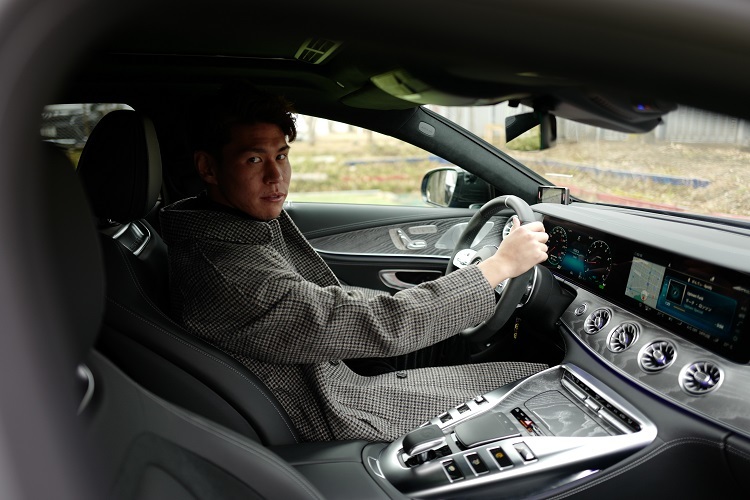
―― Until now, I have had little connection with international tournaments, but what kind of place is the World Cup?
"It's my dream. Watching the 2002 Korea-Japan World Cup, I was certain I would play here someday. There is still so much to do, and participating in the World Cup is not easy. Thinking about competing against the world, I have to accelerate my growth even more. One or two years will pass in the blink of an eye, and before I know it, it will be over."
――Can you imagine yourself standing on the World Cup stage and performing well?
"I am ready. I want to compete on equal footing or better with the world. I want to show that my play can succeed at the World Cup, and prove my strength by performing on that stage. Each day, the things I can do are limited. If I don't make the utmost effort within that limited time, I won't reach that goal. It's important to do what needs to be done, and to always keep the image of competing on the world stage in mind. I want to consciously continue doing that."
— When you think about it that way, don't you tend to lose sight of your surroundings and get absorbed in your own world?
"Since around last year, there have been moments when I felt this way. Honestly, there are times when I just want to focus on myself. But since it's a team sport, I believe communicating with everyone is very important. I'm not the type to lead by voice, so I want to show it clearly through my play, and I think that's what I can do. I try to separate my own matters from the team's matters. I believe I've started to find a good balance and have become less influenced by emotions."
――Is getting married a big deal?
"Getting married doesn't make me think I should work harder at soccer. I've always been dedicated to soccer, and that hasn't changed much. However, since I receive a lot of support, if I perform well or the team achieves good results, my wife will be happy too. I want to firmly show her my efforts and express my gratitude as much as possible."
――15 years ago, the soccer boy who entered Ajinomoto holding hands with Naohiro ISHIKAWA CC has grown up and stood on the same pitch. It would be interesting if juniors similar to his former self appeared.
"I still vividly remember how happy I was when I entered holding hands with Nao-san. Every time we hold hands, I feel that emotion. I think that maybe someday I'll kick the ball with this child. Nao-san also told me that a player who can play together like that might appear."
――It was also surprising that those two number 18 players scored goals on October 19, 2011, and again eight years later on October 19.
"That was thrilling. I never thought something like that could happen. When I took over number 18, it really felt heavy. But recently, I've started to feel like it's truly my number."
――Finally, what kind of year do you want this season to be?
"First, I want to maximize my individual abilities throughout the year. As a team, we want to win the J1 League and the AFC Champions League titles. To achieve that, I want to be a player who leads the team to victory. Having grown up in the academy, I believe I have more attachment to this team than anyone else. I believe that players like me leading the team will definitely make us stronger."
◇Kento HASHIMOTO Profile
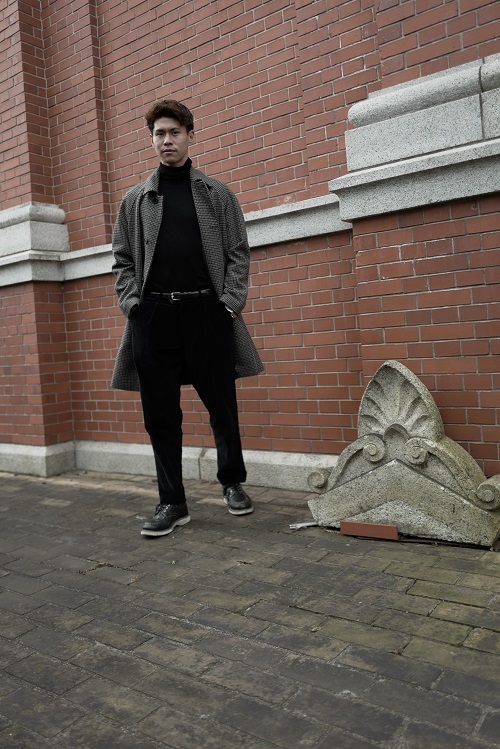
text by Kohei Baba
photo by Kenichi Arai, Masahito Sasaki
